AUSTRALIA
‘Ineffective’ rail corporation was designed to meet NSW budget goals, auditor general says
Tamsin Rose
Tue, 24 January 2023
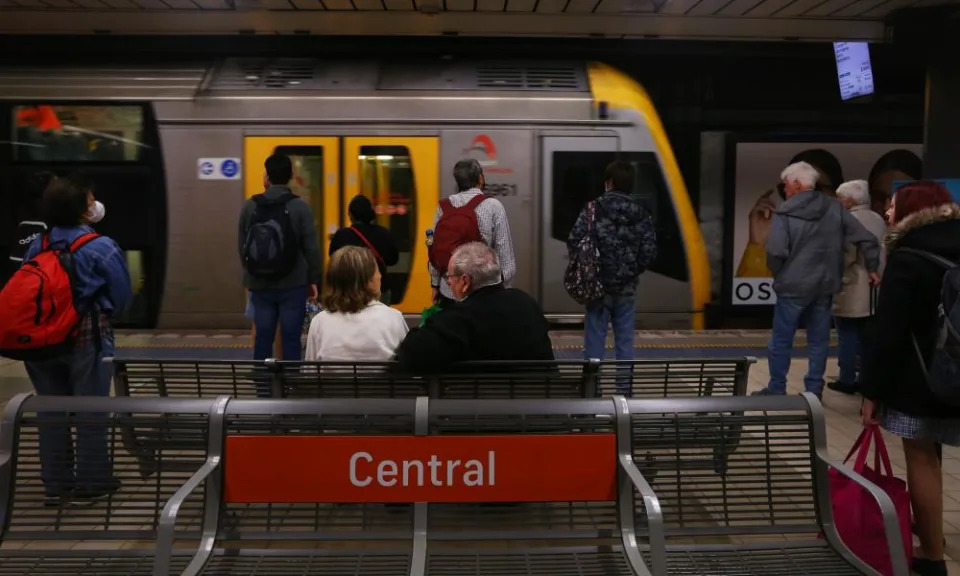
Photograph: Lisa Maree Williams/Getty Images
New South Wales’s controversial rail corporation’s formation was ineffective, incohesive and opaque and the corporation was designed to meet the government’s immediate budgetary goals, the auditor general has found.
Margaret Crawford’s report into the Transport Asset Holding Entity, or Tahe, also found the design had created an “unnecessarily complex” model with “significant uncertainty” around the possibility for future financial improvements.
“The design and implementation of Tahe was not effective,” she said.
Related: PR firm given $560,000 to combat ‘negative’ views of controversial NSW rail body
“The process was not cohesive or transparent. It delivered an outcome that is unnecessarily complex in order to meet the NSW government’s short-term budget objectives, while creating an obligation for future governments to sustain Tahe through continuing investment, and funding of the state-owned rail operators.”
Tahe was established in 2020 after seven years of planning to transfer the state’s $40bn rail assets out of the hands of the transport department and into a state-owned corporation.
The move benefited the government’s bottom line by allowing Tahe to lease assets back to operators like Sydney Trains, meaning the government could classify funding to the corporation as “equity injections” that came without negative implications for the budget.
But under accounting rules, the corporation needed to show it was separate from the government and would turn a profit.
Sign up for Guardian Australia’s free morning and afternoon email newsletters for your daily news roundup
Crawford found the “ineffective” design process had created a model with “significant uncertainty” regarding its future financial position.
She also found the agencies involved in its development relied heavily on private consultants and had “failed to effectively manage these engagements”.
A handful of agencies had been used repeatedly to provide advice on the same topic, she found, which brought the total cost of Tahe-related consultants’ fees to $22.6m – almost double the initial estimate.
Crawford described a chaotic design process in the lead-up to Tahe’s launch in 2020 with multiple workstreams and advisory committees working on it.
“The lack of clarity around the roles and responsibilities of these governance structures reduced opportunities for Transport for New South Wales and Treasury to reconcile their differing objectives for Tahe, and resolve key questions earlier in the process,” Crawford said.
Crawford recommended the government agencies involved in the scheme needed to improve accountability and transparency and review record-keeping and consultant engagement processes.
Asked about the report ahead of its release late on Tuesday afternoon, the premier, Dominic Perrottet, said other states had similar schemes because they were “right”.
“This is not something that NSW has done in isolation,” he said earlier in the day.
“Through that structure, you have better management of the transport assets and that’s why we undertook that process.”
The opposition has pledged to abolish Tahe if it is voted into government in March.
The Labor treasury spokesperson, Daniel Mookhey, described the scheme as a “budget con that’s turned into a fiscal bomb”.
In late 2021, Crawford delayed the release of the state’s finances over Tahe, after which the state poured $1.1bn into the system to meet the auditor’s concerns.
Finally giving the finances the tick just under a year ago, she said she still had concerns about the financial assumptions underpinning Tahe.
At the time, she said the NSW Treasury predictions remained “highly dependent” on revenue which “may not eventuate”, revealing taxpayers needed to contribute a further $4.1bn over the next decade to satisfy accounting standards.
Last year, Guardian Australia revealed the government awarded a public relations firm half a million dollars to devise a strategy to combat “negative” perceptions of Tahe.
BNP Paribas says to sharply cut oil production financing
Tue, 24 January 2023

French bank BNP Paribas said Tuesday it plans to cut its financing of oil extraction and production by 80 percent by 2030.
The pledge goes further than its previous 25-percent cut by 2025, even if oil refining and gas extraction are not covered.
BNP Paribas had 5.3 billion euros in oil extraction and production financing as of the end of last September, and intends to reduce that to below one billion by 2030.
By comparison, BNP Paribas had 12.1 billion euros of financing for oil refining, 5.0 billion for natural gas and 1.3 billion for coal.
The 23.7 billion in fossil fuel financing is already outweighed by the 28.2 billion in low-carbon financing, the overwhelming majority of which is for renewables.
BNP Paribas said it plans to have more than 80 percent of its energy production financing activities geared towards the production of low-carbon energies.
It set a target of 40 billion euros in outstanding financing for the production of low-carbon, primarily renewable, energies by 2030.
The bank said outstanding financing for gas extraction and production will be reduced by more than 30 percent by 2030.
It said it plans to focus financing in the gas sector on new-generation, low-emission power plants as well as supply security, gas terminals and gas transportation fleets.
The announcement by the bank comes after three activist groups threatened to file a lawsuit against the company for breaking pledges to stop financing new oil and gas projects.
They had given the bank until Thursday to respond.
Banks and asset managers are regularly scolded by climate activists for financing the fossil fuel sector, in particular new climate projects which experts say are incompatible with reaching carbon neutrality by mid-century and limiting global warming to the target of 1.5C as set out in the Paris climate pact.
ktr/rl/imm
Brexit was meant to be ‘done’, but in 2023 UK-EU harmony will still be a distant dream
Anand Menon
Tue, 24 January 2023

Just under three years since the United Kingdom left the European Union – and over six since it voted to do so – the bilateral relationship remains a subject of often bitter debate between the two sides and within the UK itself. This is hardly surprising. The 2016 referendum was deeply divisive: leave and remain identities persist to this day. Moreover, the two sides are still at loggerheads over the Northern Ireland protocol. Yet there is a structural element to this too, which implies that, come what may, a stable equilibrium in UK-EU relations will remain elusive.
This is clearly the case should no solution be found to the standoff over the protocol. In that event, it is possible the trade and cooperation agreement (TCA), which underpins the bilateral relationship, will itself not be fully implemented – and that a running dispute and conceivably even a trade war may ensue.
Yet even should a mutually satisfactory deal be found, bilateral relations will remain unstable, as our new report implies. For one thing, several issues are scheduled to be revisited in the coming years. Fishing quotas will have to be renegotiated in 2026. On financial services, the UK has to decide whether to extend the temporary scheme that allows European Economic Area-based financial services to continue to enjoy their pre-Brexit passport rights and that is currently due to end at the end of 2023, while the EU must decide whether to renew its equivalence decision on UK clearing houses in June 2025. Changes in the rules of origin applied to trade in electric vehicles will come in in 2024 and 2027; and given the lack of domestic battery-making capacity on both sides, this might lead to an end to tariff-free trade in EVs. And, of course, the TCA itself is due to be reviewed from 2025.
Any of these discussions could prove explosive given the political and economic stakes. And even if bilateral negotiations go well, purely domestic action by either side might serve to rock the boat. The “level playing field” conditions included in the TCA were intended to ensure that workers’ rights and social and environmental protection are not reduced. Consequently, adoption of the retained EU law (revocation and reform) bill, currently making its way through parliament, might trigger trade sanctions from the EU were the removal of EU legislation to imply an impact on trade and investment.
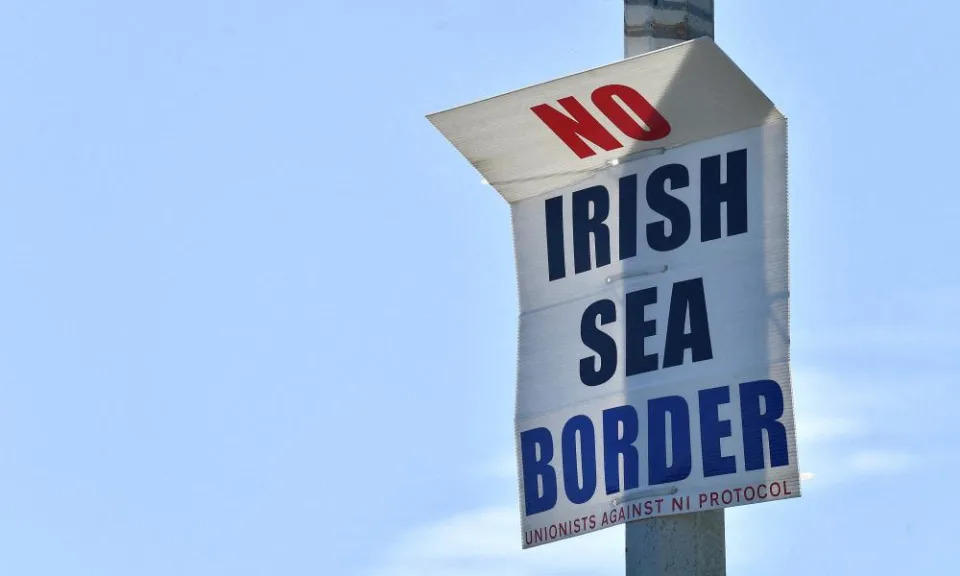
‘The EU and UK are still at loggerheads over the Northern Ireland protocol’. Photograph: Clodagh Kilcoyne/Reuters
Equally, what the EU chooses to do will have implications over the Channel. Its carbon border adjustment mechanism – essentially a way of imposing a fee on carbon-intensive goods from countries with less stringent climate policies – implies that, should the UK fail to align with what the EU is proposing, UK exporters might be subject to levies – with the steel sector particularly vulnerable. And, lest we forget, divergence between UK and EU regulatory systems will impact on the Great Britain-Northern Ireland border, hindering the flow of goods.
And then there is the impact of the consequences of Brexit. Last year saw the debate about the economic impact of Brexit kick off in earnest as we began to get real-world empirical data to compare to the economic forecasts. A growing proportion of the electorate are coming to believe that Brexit is having a harmful effect on the UK economy. There is no shortage of voices calling for amendments to the current status quo.
For some, this is taking the form of demands to mitigate some of the deleterious impacts of the current deal. Researchers in both the UK and EU have voiced their concerns about EU foot-dragging on UK participation in the Horizon research programme. It is conceivable, too, that the UK may reconsider its decision to leave the EU’s “list of travellers” scheme, thereby making it easier for school trips from EU states to visit.
At the same time, polling indicates growing support for rejoining the EU. The Brexit debate will remain live within the UK and the signs are that pressure will not abate for a relationship with the EU going beyond the TCA – and potentially implying single market membership or even a future membership application.
In short, we are not – and with apologies to David Cameron – about to stop banging on about Europe. Discussing his country’s relationship with the US, former Canadian prime minister Pierre Trudeau reflected that “Living next to you is in some ways like sleeping with an elephant. No matter how friendly and even-tempered is the beast, if I can call it that, one is affected by every twitch and grunt”.
The EU is clearly not the US. Yet its economic influence is significant and it remains the UK’s largest trading partner. Whether it be the bilateral relationship itself, or the implications of what the two sides decide to do at home for that relationship, Europe will loom large in our political debate for the foreseeable future. The elephant’s twitches and grunts will continue to disturb us.
Anand Menon is director of The UK in a Changing Europe and professor of European politics and foreign affairs at King’s College London
UK
Labour MP takes aim at Home Secretary in expletive-laden rant
Tom Bedworth
Tue, 24 January 2023

Charlotte Nichols unloaded an expletive-laden tirade on the Home Secretary (Image: Newsquest / Parliament UK)
WARRINGTON North's Labour MP, Charlotte Nichols, has been at the centre of controversy after she posted an expletive-laden rant against the Home Office.
Taking aim at the Home Office and Home Secretary, Suella Braverman, Ms Nichols claimed that the Home Secretary has used 'Nazi era language' when discussing 'contemporary refugees.'
The debate began due to an exchange between the Home Secretary and a survivor of the Holocaust - which saw the mass murder of six million Jews during the Second World War.
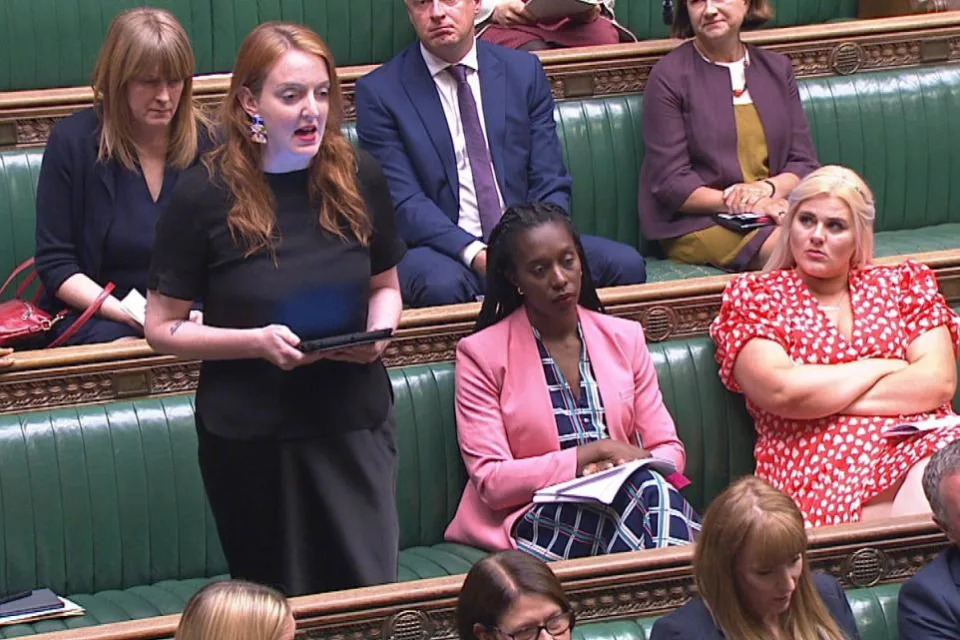
Warrington Guardian: Ms Nichols lashed out at the Home Secretary for her use of 'Nazi era' language
Ms Nichols lashed out at the Home Secretary for her use of 'Nazi era' language (Image: Parliament UK)
Suella Braverman was taking questions at an event when a Holocaust survivor asked the Home Secretary about her use of language, including the terms 'swarms,' and 'invasion' when referring to migrants.
The survivor noted that the language reminded her of the language used to 'dehumanise and justify the murder of [her] family and others.'
In the exchange, the Home Secretary was heard responding saying: "We mustn't shy away from saying there is a problem - and there is a huge problem when it comes to illegal migration; the scale of which we have not known since the war.
"I won't apologise for language I have used to demonstrate the scale of the problem[...] and I'm not going to shy away from difficult truths."
The Home Secretary added that she is 'proud of' the country's record on supporting migrants from places such as Ukraine, Syria, and Afghanistan.

Warrington Guardian: The Home Secretary has been accused of using 'Nazi era' language by one of Warrington's MPs
The Home Secretary has been accused of using 'Nazi era' language by one of Warrington's MPs (Image: Parliament UK)
Responding to the exchange online, Charlotte Nichols - who is Jewish - said: "The full exchange doesn't make what Suella Braverman said any less horrific, nor does it contextualise or minimise her remarks where - in response to a Holocaust survivor's question - she justified her use of Nazi era language about contemporary refugees."
Ms Nichols added: "F*** her and f*** you."
Having seen Ms Nichols' response to the exchange, a Conservative councillor for Culcheth, Wendy Maisey, took to social media.
Cllr Maisey said: "I see ‘Warrington Conservatives best asset’ aka the Labour MP for Warrington North has been up to her foul mouth 2.30am rants again.
"One of the main roles of an MP is to represent their constituents in the chamber and debate… Not this."
Ms Nichols responded to Cllr Maisey, saying: "The fact you find someone who justified their use of Nazi era language about refugees to a Holocaust survivor less offensive than what I said in response to that is very telling."
Speaking to the Warrington Guardian, Charlotte Nichols said: "I do not apologise for my sentiments of disgust at the Home Secretary using Nazi-era language about refugees in response to a question from a literal Holocaust survivor.
"Likewise, Ministers trying to use official Home Office resources to gag the Freedom from Torture charity [the charity that highlight the Home Secretary's exchange with a survivor] is disgraceful.
"I was elected to champion Warrington North’s values, and we are better than this.
I will not accept lectures from the chair of Warrington Conservatives [Cllr Maisey] who has a record of making homophobic and antisemitic comments, and who oversaw the council selection of candidates who were removed for comments about the "Aryan race" and support for Tommy Robinson respectively.
"I do not hide behind anonymity. I stand by my words and will never stand back from for fighting with passion for a better and fairer society."
Cllr Maisey has not responded to a comment request by the Warrington Guardian.
UK‘It isn’t too late to turn things around’: Over 500 museums join forces for climate project aimed at ‘inspiring’ children
Annabel Nugent
Tue, 24 January 2023

Hundreds of museums across the UK are joining forces to “change children’s awareness and understanding of biodiversity loss”.
Launched on Tuesday (24 January) by the UK’s leading arts charity, Art Fund, The Wild Escape will see 500 instututions participate, marking the largest ever collaboration between British museums.
The Wild Escape hopes to inspire children across the country to visit museums and respond creatively to the threat to the UK’s natural environment. Children will be encouraged to look for animals featured in museum collections and creating their own wildlife artworks.
Their artworks will then be brought to life in a huge-scale immersive display, which will be unveiled on Earth Day (22 April) 2023.
The Wild Escape is inspired by BBC One’s forthcoming Wild Isles series, which will be presented by Sir David Attenborough. It is in partnership with BBC Bitesize, the free study resource for students, which will host films showing an artist creating a work inspired by animals in the UK’s museum collections.
Artists due to take part in the intiative include FKA Twigs, Es Devlin, Heather Phillipson, Rana Begum, Mollie Ray, Yika Shonibare, Tai Shani, Mark Wallinger, Angela Palmer, and Claire Twomey.
Jenny Waldman, director of Art Fund, said that The Wild Escape hopes to educate children and raise their awareness and understanding of biodiversity loss, which is “one of the defining challenges of our lives”.
“The Wild Escape is a first. We want to show how museums, by working together, can bring a fresh angle to learning, especially to welcome children’s creative responses to our great collections,” said Waldman.

Clare Twomey in her studio, drawing for The Wild Escape (© Clare Twomey)
According to a report by the Environment Agency, published in July 2022, England is one of the most nature-depleted countries in the world.
A quarter of mammals in England and almost a fifth of UK plants face a threat of extinction. Meanwhile, a third of British pollinator species have declined.
The project is in partnership with the World Wide Fund for Nature (WWF), the Royal Society for the Protection of Birds, the National Trust, and English Heritage. It is one of the largest ever museum projects to ever be funded by Arts Council England.
Rosalind Mist, director of education and youth management at WWF, said: “It isn’t too late to turn things around, and young people are key to shaping the nature of the natural world”.
The Wild Escape is open to every primary school age child to take part from now until July.
NO LAUGHING MATTERUK
Staff have 'lost trust' with Basildon Hospital bosses over nitrous oxide sagaLewis BerrillMon, 23 January 2023  Staff have 'lost trust' - Basildon Hospital (Image: PA)STAFF at Basildon have “lost trust” in bosses after the results of health testing for high levels of nitrous oxide were kept hidden.Hospital bosses first learnt of Entonox - nitrous oxide used as pain relief during labour - in the ward since the summer of 2021.Nitrous Oxide personal sampling was completed on June 15, 2021, with high results found in nine staff members.However, those nine staff were not told they had recorded high tests leading to large amounts of anxiety and a level of distrust between management and staff.The nine staff who recorded high tests but were not told have been offered both psychological and wellbeing support and have received an apology from the hospital.Results ranged from from 107 to 2983.7 parts per million (ppm) - when the legal workplace limit is 100ppm - but the report was not shared with staff for 18 months.“We have lost trust in the hospital after we were kept in the dark so long, with everyone acting as if everything was okay,” one midwife told the Echo.“We are frustrated that they had our test results for all that time and nobody thought to tell us.“Or maybe nobody was brave enough to do so.”The results of this testing were sent in a report to the maternity department in June 2021. However, it was not shared with the staff involved.Hospital documents from a board meeting state “it is unclear of what processes were followed in terms of sharing and escalation, however, it is noted that this was added to the risk register at that time.”Three mobile destruction units were ordered but only installed in October 2022 - which prompted staff to challenge bosses on the matter.On October 11 the trust’s executive body was informed that the results had been kept from staff.“This caused a significant amount of anxiety and distrust between staff and senior leadership team,” the meeting documents added.A spokesperson for Mid and South Essex NHS Trust, said: “We have followed all of the expert advice provided to us to deal with the issue of nitrous oxide in the air at our maternity unit at Basildon Hospital.“Significant improvements have been made and it is perfectly safe for service users and their families to continue to use the maternity unit as normal. We have taken action to resolve the situation and an investigation is underway.“Support and advice is being offered to our staff. Mitigations have been put in place, based on clinical recommendations, and we are continuing to keep our staff informed.”
Staff have 'lost trust' - Basildon Hospital (Image: PA)STAFF at Basildon have “lost trust” in bosses after the results of health testing for high levels of nitrous oxide were kept hidden.Hospital bosses first learnt of Entonox - nitrous oxide used as pain relief during labour - in the ward since the summer of 2021.Nitrous Oxide personal sampling was completed on June 15, 2021, with high results found in nine staff members.However, those nine staff were not told they had recorded high tests leading to large amounts of anxiety and a level of distrust between management and staff.The nine staff who recorded high tests but were not told have been offered both psychological and wellbeing support and have received an apology from the hospital.Results ranged from from 107 to 2983.7 parts per million (ppm) - when the legal workplace limit is 100ppm - but the report was not shared with staff for 18 months.“We have lost trust in the hospital after we were kept in the dark so long, with everyone acting as if everything was okay,” one midwife told the Echo.“We are frustrated that they had our test results for all that time and nobody thought to tell us.“Or maybe nobody was brave enough to do so.”The results of this testing were sent in a report to the maternity department in June 2021. However, it was not shared with the staff involved.Hospital documents from a board meeting state “it is unclear of what processes were followed in terms of sharing and escalation, however, it is noted that this was added to the risk register at that time.”Three mobile destruction units were ordered but only installed in October 2022 - which prompted staff to challenge bosses on the matter.On October 11 the trust’s executive body was informed that the results had been kept from staff.“This caused a significant amount of anxiety and distrust between staff and senior leadership team,” the meeting documents added.A spokesperson for Mid and South Essex NHS Trust, said: “We have followed all of the expert advice provided to us to deal with the issue of nitrous oxide in the air at our maternity unit at Basildon Hospital.“Significant improvements have been made and it is perfectly safe for service users and their families to continue to use the maternity unit as normal. We have taken action to resolve the situation and an investigation is underway.“Support and advice is being offered to our staff. Mitigations have been put in place, based on clinical recommendations, and we are continuing to keep our staff informed.”
Why has an exhibition of Banksy replicas popped up in Russia
Jonny Walfisz
Tue, 24 January 2023

A collection of Banksy replicas has gone on show in Russia, despite political opposition by the anonymous artist.
The St. Petersburg exhibition contains 150 replicas of Banksy’s work and has quickly become one of the city’s most visited places.
The collection is a transfer from the Moscow exhibition “To Find Banksy” that was put together before the Russian invasion of Ukraine began. The organisers have stressed that they don’t want to concentrate on politics.
But trying to keep anonymous street-artist Bansky apolitical is a fool’s errand. All the more so for an unauthorised exhibition of replicas taking place in a country he actively campaigns against.
Since Russia invaded Ukraine in February 2022, Banksy has highlighted the Ukrainian people’s plight. Just this month, he facilitated an auction of 50 screen prints to raise funds for a charity helping civilians affected by the conflict. The auction was cyber-attacked by Russian IP addresses.
The exhibition in St. Petersburg includes full-sized sculptures and entire recreated rooms with replicas of Banksy’s iconic graffiti works. None of the artworks Banksy has made in Ukraine feature.
“I was even wondering whether his last works that are against the special military operation would be here. I think it would be correct to ask ourselves whether we need all this so that we think of it. Banksy suggests many things to us, especially in the new works he did. I even think his new works are missing here. They could have been added,” says Kirill Kovalev, a visitor.
“To be honest, I draw no parallel between political views and art. I think it should be distinguished. Therefore, it's his choice (to speak out against the special military operation in Ukraine),” says Maria Potapova, another visitor.

A woman takes a selfie at an artwork that was made by British street artist Banksy on a building destroyed by the Russian army in Borodyanka, Kyiv region, Ukraine - AP Photo
Banksy already condemned an unofficial exhibition of actual works in Moscow in 2018. The unofficial ‘Banksy’ exhibition opened in Moscow’s Central House of Artist Museum but has since moved through Russia, Spain, Portugal, the US, and Hong Kong.
Over three million people have seen the unauthorised exhibition.
“What the hell is that?” Banksy wrote in a text exchange when he found out.
Banksy responded to the 2018 exhibition in typical fashion, posting just the text exchange.
“You know it’s got nothing to do with me right? I don’t charge people to see my art unless there’s a fairground wheel,” he wrote, referencing his 2015 Dismaland exhibition, a parody of Disneyland, in the UK.
As much as he was against the exhibition, he didn’t take further action as he explains: “Hmm—not sure I’m the best person to complain about people putting up pictures without getting permission.”
Banksy has allowed some of his works to enter Russia more recently though. In 2021, he authorised the auction of eight works including a print of 'Love is in the Air' and pieces from the Dismaland theme park.
Auctioned at the Tver City Museum and Exhibition Center northwest of Moscow, the museum’s Elizaveta Maksimova told reporters: “There are certificates for the exhibits which prove they are authentic and signed by Banksy.”
Check out the video above for footage of the St. Petersburg exhibition.
New statistics show transgender hate crimes rising faster than any other in Scotland
David Bol
Tue, 24 January 2023 a
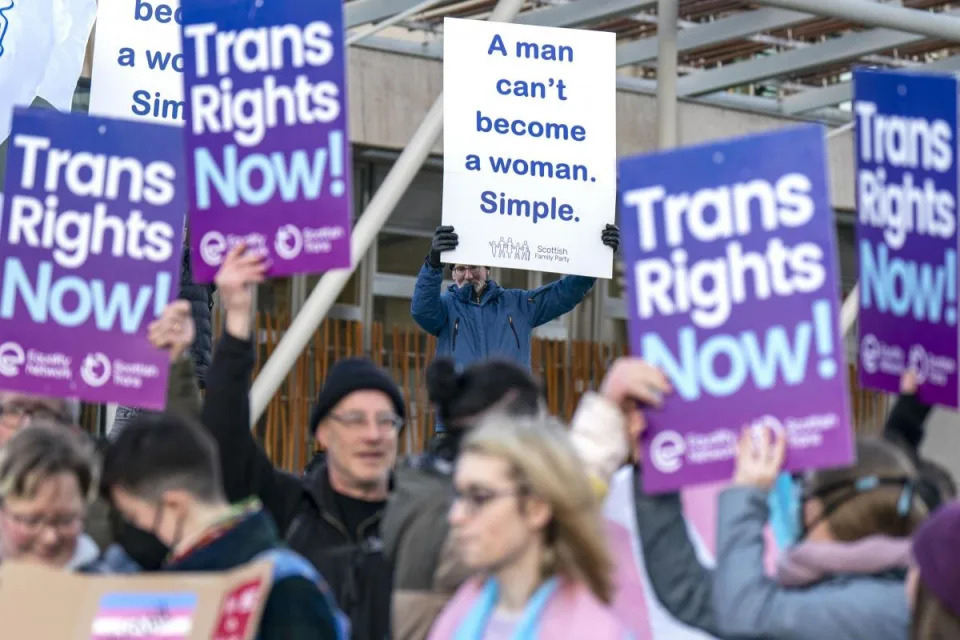
Transgender rights protesters at Holyrood (Image: PA)
Hate crimes against transgender people are rising faster than any other in Scotland, it has emerged, as new figures published by the Scottish Government showed reports to police have soared in the past year.
New statistics published by the Scottish Government have revealed that the number of hate crimes recorded against transgender people has soared by 68 per cent from 2020/21 to 2021/22 and has increased more than threefold over a seven-year period.
Green MSP Maggie Chapman said the sharp rise incidents has been “fuelled by a cynical campaign of vicious lies” over Scotland’s gender recognition reforms.
According to the statistics, hate crimes where transgender was the aggravator has jumped from 53 in 2014/15 to 110 in 2021/21 and 185 in 2021/22.
Read more: Misinformation over gender recognition plans used to 'whip up moral panic'
The total number of hate crimes has increased slightly over the space of 12 months from 6,720 recorded in 2020/21 to 6,927 for 2021/22.
Hate crimes against people due to their sexual orientation has also risen from 1,110 in 2014/15 to 1,683 in 2021/21 and 1,855 in 2021/22.
The number of hate crimes targeting disabled people has also climbed over the years, moving from 269 in 2016/17 to 435 in 2020/2021 and 552 in 2021/2022.
The most common aggrevator for recorded hate crimes, race, has seen a slight decrease from 5,178 incidents in 2014/15 to 4,316 in 2020/21 and 4,263 in 2021/22.
An MSP has warned that the toxic debate around gender recognition for trans people in Scotland has led to more transgender people being targeted.
Greens equalities spokesperson, Maggie Chapman, said: "We should all be angry about the appalling increase in transphobic incidents in Scotland.
“This awful rise must also not be viewed out of context. It has been fuelled by a cynical campaign of vicious lies and smears spread about our trans siblings.
Read more: LGBT Scots seeing 'unacceptable' rise in violent hate crimes against them
"Much of it has been whipped-up and encouraged by powerful voices, such as those with significant public platforms and those in the UK government who want to distract from their own failings.”
She added: "This abusive behaviour must never be normalised. Prejudice and bigotry ruin lives. Behind every one of these crimes is a real person who has been attacked just for being who they are.
Read more: Nicola Sturgeon warns not to 'further stigmatise' trans people
"My heart goes out every single person who has been targeted and abused. I stand in solidarity with them and their friends and allies. This poisonous transphobia has absolutely no place in a modern and progressive Scotland."
According to the study, 27% of transphobic hate crimes were carried out online, 28% took place in public and 23% took place at a private property. The vast majority of transgender identity aggravated hate crimes were reported to the police by the victim.
In almost 90% of transgender identity aggravated hate crimes in 2021/22, the perpetrator should prejudice towards those from the transgender community based on “words used, action taken or perceptions of the victim”.
But the Scottihs Conservatives, the only Holyrood party who oppose the gender recognition reforms, have lablled Ms Chapman's claims as "malicious, unfounded and untrue".
The Tories' equalities spokesperson, Rachael Hamilton, said: “No-one should ever be targeted or attacked for their gender identity, and this rise in hate crimes against transgender people is appalling.
“However the idea that this has been ‘whipped up’ by the UK Government is malicious, unfounded and untrue. While the debate about the SNP’s gender recognition reforms has evoked strong feelings on both sides, the UK Government and the Scottish Conservatives have used sensitive and respectful language throughout."
She added: “By contrast, it has been a minority of supporters of this Bill – such as Maggie Chapman – who have used some of the most inflammatory and divisive language when discussing this sensitive issue.
“We have always been clear that trans people deserve support, respect and recognition – but this must not come at the expense of the rights and safety of women and girls.”
Police Scotland's superintendent Claire Dobson said: “Targeting anyone because of who they are is deplorable. Hate crime should have no place in society and we are working to increase awareness and encourage reporting.
“We want anyone who experiences hate crime, including when our officers and staff are targeted, to report it in the knowledge they will be treated fairly, with respect and the circumstances investigated professionally.”
The Scottish and UK governments have been contacted for comment.
'It's done us proud': 147-year-old Bury chip shop on market as owners set to retire
Isabel Oldman
Mon, 23 January 2023

Sara and Gordon Taylor, owners of Wood Street Chippy (Image: Gordon Taylor)
The owners of a 147-year-old fish and chip shop in Bury are looking for someone to take over the business ahead of their retirement.
Gordon Taylor, 64, and his wife Sara, 63, are looking to reel in the perfect new owner for Wood Street Chippy, which they have run since 2003.
After successfully running the business for two decades, the couple have decided it’s time to retire and are looking forward to travelling in their van and spending time with their family.
The chippy was originally put on the market two years ago and if a new owner doesn’t come forward by March this year, it could be the end of a business which has been a part of the community since 1876.
The chippy and the adjoining building, which includes a two-bedroom maisonette, are currently on the market for £225,000.
Gordon says the job comes with freedom and flexibility and the chance to be an important part of the community.
He said: “ You’re your own boss so your destiny is in your hands, which is motivation to do a good job.
“You’re not just the chippy owner, you’re basically a hive of the community, we know hundred of people around here, we have that many loyal customers.
“You can’t go anywhere around here without somebody knowing you.”
Despite the rising cost of living, business is still going strong with many people returning to the shop again and again.
READ MORE: Indie band Space entertain packed out audience at Wax and Beans, Bury
“Our biggest complaint, if that is a complaint, is that we’re not open enough,” he added.
Gordon says that he and Sara have loved running the chippy over the years but feel now is a good time to hand over the business to someone new.
“As a whole, I wouldn’t change a thing, I have no regrets.
“When we bought this place 20 years ago, some people thought we were absolutely crazy because neither of us had done it before and 20 years later we’re ready to retire and we’ve been able to afford a nice life.
“it’s done us proud over the years.”
The couple are prepared to give full training to anyone who buys the business and are more than willing to share what they’ve learned over the years.
Gordon said: “Quality and customer service [is key], do a good job and be friendly to people.
“We’re not just interested in taking people’s money, your customer service has got to be good.
“When we first bought the place, the people who we bought it from gave us a bit of advice which was ‘try and remember as many people’s names as you can’.
“Do a good job and be friendly, and it pays off in spades.”
Wood Street Chippy is listed for sale with Rosens.
Quebec's nurses order rejects call to delay exam despite concern over failure rate
Wed, January 25, 2023
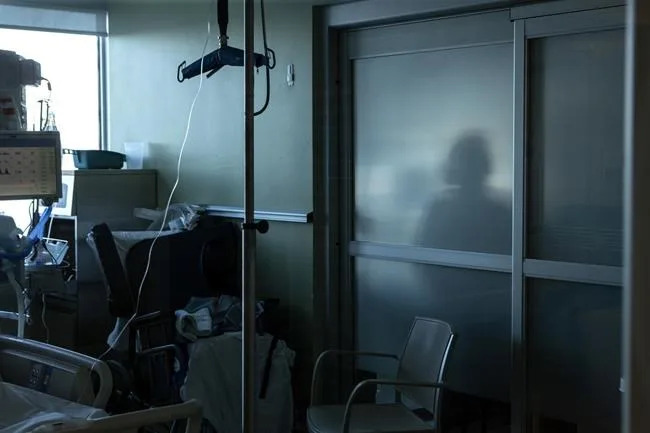
MONTREAL — Quebec's order of nurses is rejecting a recommendation to push back the date of its next licensing exam amid an ongoing investigation into why more than half of candidates failed the last sitting.
The order said today that the next exam will go ahead on March 27 as scheduled, but nursing students will be given the option to wait until the next date in September if they prefer.
The commissioner who oversees access to the province's professional orders said last week that it was still too early to explain last fall's abnormally high failure rate.
André Gariépy recommended the next date to write the exam be pushed back while he continues his probe into what happened.
While the order declined to change the date, it agreed to Gariépy's suggestion of allowing students who had failed for a third — and normally final — time to retake the test.
Gariépy's interim report found that just 45.4 per cent of nursing students passed the Sept. 26 licensing exam, compared to a pass rate of between 63 and 96 per cent in previous sittings.
Gariépy said nursing students have largely blamed what they see as flaws in the exam, while the order of nurses has suggested student preparation could have been affected by the COVID-19 pandemic.
This report by The Canadian Press was first published Jan. 25, 2023.
The Canadian Press














